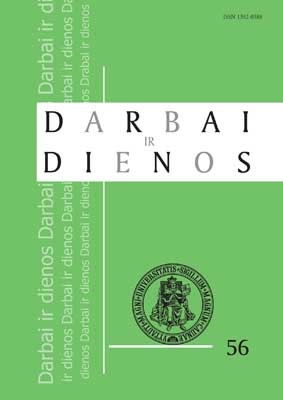Vilniaus klausimas bendrinės lietuvių kalbos sampratose: metalingvistinių vilniečių komentarų tyrimas
The Question of Vilnius in the Concept of Standard Lithuanian: a Study of the Metalinguistic Commentaries of Vilnius Speakers
Author(s): Ramunė Čičirkaitė, Loreta VaicekauskaitėSubject(s): Cultural Essay, Political Essay, Societal Essay
Published by: Vytauto Didžiojo Universitetas
Keywords: Vilniaus klausimas; kalba; metalingvistiniai komentarai; Vilnius question; language: metalinguistic commentaries
Summary/Abstract: Kaip matyti iš straipsnio pavadinimo, skaitytojams norima įteigti, kad esama ne vienos bendrinės lietuvių kalbos sampratos. Dar daugiau – ketinama atskleisti skirtingų sampratų išryškinamą kontroversišką Vilniaus kalbos santykį su bendrine šnekamąja kalba. Neskaitant bendrinės lietuvių kalbos kūrimo laikotarpiu svarstytų idėjų ir alternatyvų, šiandien likusių istorijos šešėlyje (žr., pvz., Venckutė 1987, Subačius 1998), apie skirtingus bendrinės kalbos konceptus lietuvių kalbotyroje iš esmės esama tik užsiminta ir tik ribojantis vyraujančios, tradicinės, sampratos rėmais bei nusistovėjusiais bendrinės kalbos apibrėžimo kriterijais (žr. Aliūkaitė 2009). Vilniaus, kaip galimo bendrinės šnekamosios kalbos formuotojo, „klausimas“ taip pat praktiškai nesvarstytas, nors, kaip bus matyti, yra buvęs keltas. The paper focuses on two concepts of standard language (SL) – the dominant official one and that of ordinary speakers – and raises the issue of whether the speech prevalent in the capital city of Vilnius could be seen as forming modern spoken Lituanian. Unlike the other speech communities where the SL developed from the way people spoke in the capital city, the Lithuanian SL is based on the morphology and phonetics of the southern sub-dialect of West Highland. At the time of the formation of the SL at the end of the 19th and beginning of the 20th c., Lithuanian was practically not used in Vilnius. Polish and Yiddish were the languages spoken; and in general the question of whom the Vilnius city itself “belonged” to (the notorious “Vilnius Question”) was not solved in favour of the Lithuanian state. Today the situation with Vilnius is completely different: Vilnius is a multilingual city, but Lithuanian is dominant. The language of Vilnius is regarded as the SL by many dialect speakers and the features of it are spreading in the broadcast media. Nevertheless the normative ideology still rules out the possibility that the language spoken by most inhabitants of Vilnius could be viewed as a standard variety. The core element of the official concept of the SL is a correctness and purity that must be regulated and enforced by law. Vilniusian speech is downgraded in the official ideological discourse and due to Polish, Russian, and dialectal interference is held to be a polluted semilanguage. The research was based on 64 interviews, conducted in 2010, with Vilnius-born speakers of different age and social status. The metalinguistic commentaries revealed that in spite of the official ideology the Vilniusian language is scored highest among other varieties of Lithuanian. The citizens of Vilnius base their attitudes on a different concept of SL than the prescriptive one. For them the SL is first of all tied to the language of the capital, and the main criterion of assigment of it to the SL is unmarkedness with respect to dialectal features.
Journal: Darbai ir dienos
- Issue Year: 2011
- Issue No: 56
- Page Range: 57-76
- Page Count: 20
- Language: Lithuanian

